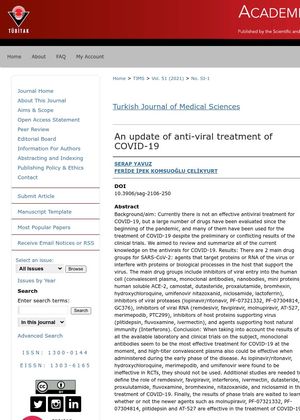An Update on Antiviral Treatment of COVID-19
August 2021
in “
Turkish Journal of Medical Sciences
”

TLDR As of December 2021, the most effective COVID-19 treatments were monoclonal antibodies and possibly early-administered convalescent plasma, while several drugs were found ineffective or were still under evaluation.
As of December 2021, there were two main groups of drugs being evaluated for the treatment of COVID-19: those that target the virus's proteins or RNA, and those that interfere with host proteins or biological processes that support the virus. The most effective treatment at the time was found to be monoclonal antibodies, with high-titer convalescent plasma also potentially effective when administered early in the disease's course. Drugs such as lopinavir/ritonavir, hydroxychloroquine, merimepodib, and umifenovir were deemed ineffective based on randomized controlled trials (RCTs) and were not recommended for use. The roles of several other drugs, including remdesivir, favipiravir, interferons, ivermectin, dutasteride, proxulutamide, fluvoxamine, bromhexine, nitazoxanide, and niclosamid, were still being defined, and results from phase trials for newer agents such as molnupiravir, PF-07321332, PF-07304814, plitidepsin, and AT-527 were awaited.
